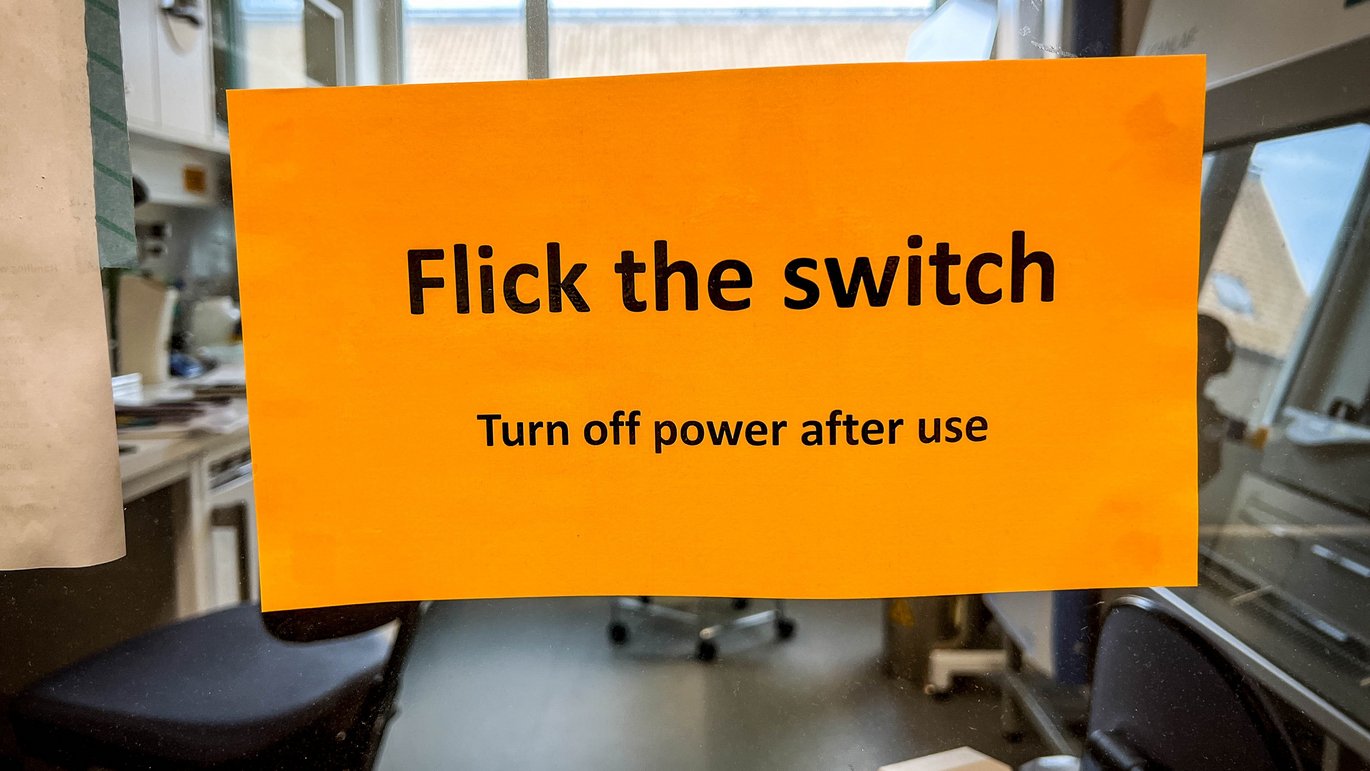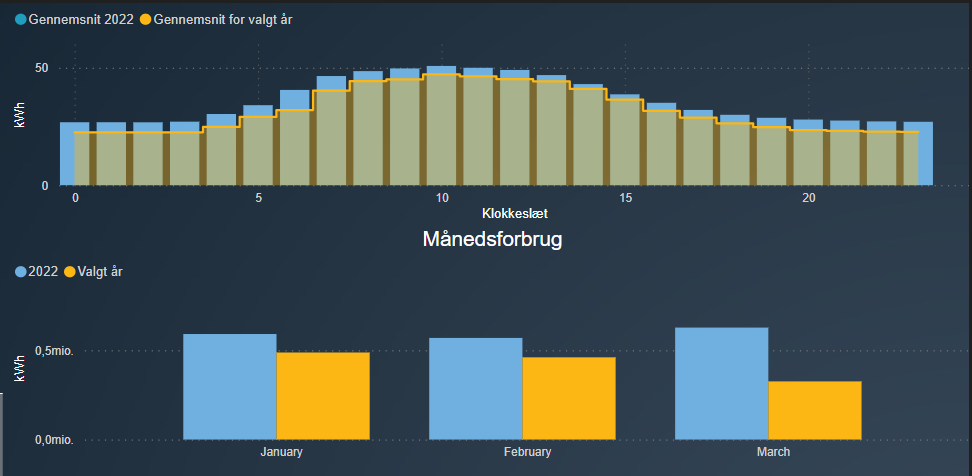Kilowhat have we done?
Denmark is in the midst of an energy crisis, and Aarhus University introduced a wide range of energy-saving initiatives in September 2022 in response to the soaring electricity prices. Since then there has been a lot of turning off, saving and turning down, but energy prices remain high. At the Department of Biomedicine, it was therefore decided to appoint ‘ambassadors for energy savings’, who are responsible for ensuring that electricity is saved locally wherever possible.

The Skou Building, which belongs to the Department of Biomedicine, hides a furry secret: The basement is teeming with mice and rats. But while Danes are not in general wild about hosting these uninvited guests, at Health the furry creatures are quite welcome. Students and researchers namely use the approximately 12,000 rodents in the Skou Building’s laboratory animal stables for scientific experiments.
However, it is not free to have so many guests living there. A large number of steam generators, autoclaves, freezers, two giant robots specially built to clean the animal cages, and advanced ventilation systems are just some of the many major energy consumers that are necessary for the operation of the animal facility.
Energy ambassadors in the fight against the climate crisis
Martin Iburg Sølvstad is an animal technician in the Skou Building. He takes good care of the experimental animals and is especially responsible for keeping track of the basement’s many robots and machines. He is also one of the newly-appointed ‘ambassadors for energy savings’.
“I was asked whether someone would like to take on the role. Together with my colleague Karina, I spend a lot of time down in the laundry room and have a good knowledge of which items of equipment consume a lot of power, so it was natural for us to take a closer look at where we could save,” he says.
In the fight against the climate crisis, Aarhus University and the faculty launched a number of energy-saving initiatives in September 2022 under the heading ‘Kilowhat can you do?’ In this connection, so-called ‘ambassadors for energy savings’ were appointed from among the employees of the Department of Biomedicine with the task of ensuring that local efforts are made to save electricity where possible.
Martin Iburg Sølvstad has been responsible for this in the laboratory animal facilities.
Since September 2022, in the basement below the Skou Building, they have for example turned off the fume cupboards, turned off freezers when not in use, and made sure that the robots, washing machines, LAF cabinets, computers and lights are switched off when they are not needed for operations, or when the employees go home.
“This has affected us a bit, and there are definitely more things you need to remember to turn on or off than there used to be. It's particularly important to remember to turn the LAF cabinets on and off: They provide ventilation and protect employees who work with potentially harmful substances, but we have put up large signs that you can’t avoid seeing. We manage to do everything that we set out to do, and this makes a lot of sense,” says Martin Iburg Sølvstad.
Small signs make a big difference
Higher up in the Skou Building is the Paludan Lab, where they conduct research into the role of the immune system in viral diseases and infections. Here, lab manager Marie Beck Iversen has been responsible for coordinating local compliance with the energy-saving initiatives.
“As lab manager, I help to run the laboratory and ensure that conditions are optimal for the people who work here. If we do not optimise our energy usage, it could have major financial consequences for the university, so of course I want to make a difference,” she says.
In the laboratory, they work with many of the same energy-saving initiatives as in the basement – turning off and shutting down equipment that is not in use. But in the Paludan Lab and the surrounding laboratories, they have also found a special way to remind each other to save electricity.
“None of us wants to stand around with a big stick watching out for offenders, so we talked about how it would be good to make some clear, laminated signs that were not judgemental. So we have hung up a number of slogans and funny quotes as good reminders,” says Marie Beck Iversen.
“We’ve put signs in different colours in the laboratories, and then we move them around once in a while. You quickly get used to a sign if you see it every day, so when we change the colours and the locations on an ongoing basis, it helps to make the staff more aware of them and remember the good advice they contain.”
Thinking in new, green ways
The new energy initiatives at Health cover everything from turning off lights and electronic devices at local level to optimising ventilation systems and installing energy-efficient lighting solutions in the faculty’s buildings.
And they have worked. In the first months of 2023, for example, the faculty used 10% less heating and 17% less electricity than in the same months in 2022.
After almost six months of work with the initiatives, the faculty has reduced its energy consumption by a significant amount. Conor Leerhøy, head of building services at Health, confirms that throughout the period, the faculty has maintained the savings seen in relation to the equivalent months in 2022:
“At the faculty, we continue to maintain the level of savings that we started in September 2022. This is very positive, but we must remember to stick to the new, good habits, because they make a huge difference both financially, in relation to the continuing high energy prices, and in the general work to ensure the university’s sustainability,” he says.

For animal technician Martin Iburg Sølvstad, too, work on energy savings is something that it makes sense to go on doing – energy crisis or no.
“We haven’t lost anything through this. On the contrary, I think I now know a lot more about what things actually cost, and how much energy they consume. We’ve already started to think about where we can save in other areas, and not necessarily just in electricity. For example with the things we put in the mouse cages – cardboard tubes, gnawing blocks and nest-building materials for the animals. Could we find cheaper or more sustainable solutions? We’ve started to think more in these ways, and that’s a really good thing,” he says.
This view is shared by Lab Manager Marie Beck Iversen of the Paludan Lab:
“Even if there hadn't been an energy crisis, it would still be important for us to focus on the energy area. We’ve been forced now to deal with it and to think about it, but I think we should definitely retain some of the initiatives in the future, no matter what. It just makes a lot of sense in relation to the green transition,” she says.
Dean: Important that we keep going
The positive results notwithstanding, the Dean of Health encourages all employees to maintain their good habits and continue their efforts to save energy.
The energy crisis is still a major challenge, and in the Dean's opinion, it is important that we stick to the savings, reduce our carbon footprint and move in the direction of a more sustainable future.
“I’m really proud of the efforts made by the faculty’s staff to keep energy consumption down. Through our united efforts we’ve made a huge difference, but it’s important that we stick to it. There’s no prospect of the energy crisis loosening its grip on our everyday lives, so I'd like to encourage people to remember the good habits and remind each other of how to save electricity. Overall, even the smallest energy-saving measures can have a major effect,” says Anne-Mette Hvas, Dean of Health.
You can read more about the University’s energy policy and learn about how you can help to save electricity on this staff page.
Contact
Martin Iburg Sølvstad, Animal Technician
Aarhus University, Department of Biomedicine and Laboratory Animal Facility
Mobile: +45 9350 8465
E-mail: mette@biomed.au.dk
Marie Beck Iversen, Lab Manager, PhD
Aarhus University, Department of Biomedicine
E-mail: mb@biomed.au.dk
Conor Leerhøy, Head of Building Services
Aarhus University, HE Administrative Centre - Building Services
Mobile: +45 2899 2241
E-mail: conor@au.dk
Dean Anne-Mette Hvas
Aarhus University, Dean’s Office, Health
Tel.: +45 8715 2007
E-mail: dean.health@au.dk
